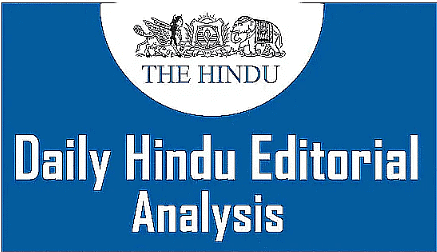UPSC Exam > UPSC Notes > Current Affairs & Hindu Analysis: Daily, Weekly & Monthly > The Hindu Editorial Analysis- 5th June 2023
The Hindu Editorial Analysis- 5th June 2023 | Current Affairs & Hindu Analysis: Daily, Weekly & Monthly - UPSC PDF Download

The Delhi ordinance is an unabashed power-grab
Context: The President of India exercised legislative power under Article 123 of the Constitution to promulgate The Government of National Capital Territory of Delhi (Amendment) Ordinance, 2023.
Need to promulgate the Ordinance: The Ordinance negates a Constitution Bench judgment of the SC, that brought “services” under the Government of National Capital Territory of Delhi (NCTD).
The scope of the Court’s verdict:
- While interpreting Article 239AA(3)(a), the Court ruled that the Legislative Assembly of the NCTD has jurisdiction over entries in List II (The State list) and List III (The Concurrent list), except three entries in List II (public order, police, and land).
- The Union of India has executive power only over these three entries in List II over which the NCTD does not have legislative competence.
- Consequently, executive power over “services” (List II) can be exercised exclusively by the Government of the NCTD.
Key highlights of the Government of NCTD (Amendment) Ordinance 2023:
- Creation of National Capital Civil Service Authority (NCCSA):
- It will be headed by the CM of Delhi, with the Chief Secretary and Principal Home Secretary of Delhi being the other two members.
- It will make recommendations to the Lieutenant Governor (LG) regarding the transfer, posting, vigilance and other incidental matters wrt to AISs and DANICS serving the Delhi government.
- All matters are required to be decided by a majority of votes. This means that the decision of the elected CM can be overruled by the two senior bureaucrats.
- Role of LG:
- The L-G will pass orders to give effect to the recommendations passed by the NCCSA.
- In case the L-G differs from the recommendation made, s/he may return the recommendation for reconsideration by the NCCSA. Therefore, the final decision will lie with the LG.
Changes brought by the Ordinance: It inserted “services” of List II into Article 239AA(3)(a), thereby expanding the scope of matters (under the control of the Union) from 3 to 4.
| The Constitutionality of the Ordinance | |
| In terms of Article 368 | In terms of Articles 141 and 144 |
| The power conferred on Parliament (under Article 239AA) is to make fresh laws for giving effect to or supplementing the provisions contained in various clauses of Article 239AA. | When a Constitution Bench of the SC declares/interprets the law, the same is binding on all courts and authorities in India. |
| Therefore, altering the scope of Article 239AA(3)(a) requires Constitutional Amendment under Article 368. | Articles 123, 141, and 144 are in Part V (The Union) of the Constitution. None has a non-obstante clause. |
| Consequently, the ordinance promulgated under Article 123 to expand the scope of Article 239AA(3)(a) is liable to be struck down. | Therefore, Article 74 could not override Article 144.
|
| Kumar Singh vs State of Bihar (2017): A seven-judge Bench of the SC held that the satisfaction of the President under Article 123 is not immune from judicial scrutiny; not a parallel source of law-making or an independent legislative authority. | |
Conclusion
The Union of India’s decision to prefer review (Article 137) and promulgate an ordinance (Article 123) simultaneously is ill-conceived.
| Important Articles of the Indian Constitution discussed above | |
| Article 74 | It provides for a Council of Ministers which shall aid the President in the exercise of the President’s functions. |
| Article 123 | It empowers the President to promulgate ordinances during the recess of Parliament (when either/both the houses of the parliament are not in session). |
| Article 137 | It deals with the review of judgments or orders by the Supreme Court. |
| Article 141 | It stipulates that the law declared by the Supreme Court shall be binding on all Courts within the territory of India. |
| Article 144 | All authorities, civil and judicial, in the territory of India, shall act in aid of the Supreme Court. |
| Article 239AA(3)(a) | The Legislative Assembly of the NCT can make laws on all the matters in the State List/Concurrent List [except police, public order and land]. |
| Article 368 | The Parliament may in the exercise of its constituent power amend by way of addition, variation or repeal any provision of the Constitution in accordance with the procedure laid down in this article. |
The document The Hindu Editorial Analysis- 5th June 2023 | Current Affairs & Hindu Analysis: Daily, Weekly & Monthly - UPSC is a part of the UPSC Course Current Affairs & Hindu Analysis: Daily, Weekly & Monthly.
All you need of UPSC at this link: UPSC
|
38 videos|5293 docs|1118 tests
|
Related Searches
















